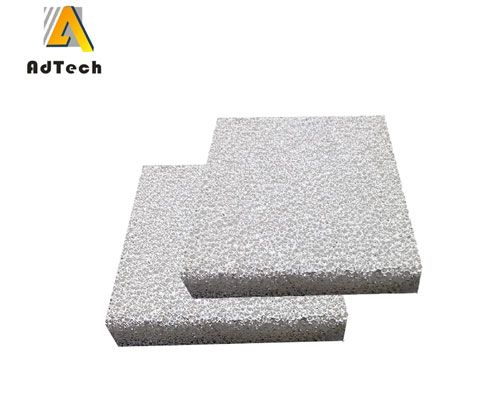Ceramic foam is a new type of ceramic filter material developed in recent years. Generally, a filter plate with a thickness of 50mm and a length of 200-600mm is made, and the porosity is as high as 0.8-0.9. When the foam ceramic filter plate is filtering the molten aluminum, the molten aluminum flows through the tortuous holes of the ceramic, and the inclusion particles contained therein are retained in the ceramic plate due to the combined action of the axial pressure, friction, and surface adsorption force of the molten aluminum flow. The inner surface of the hole and the crevice cave, so that the inclusion particles and the aluminum liquid are separated.
After a period of time, the slag remaining on the ceramic foam filter material also participates in the adsorption and interception of the slag. Its ability to absorb and intercept molten aluminum is much greater than that of ceramic plates, making it possible for the ceramic filter plate to filter out slag much smaller than its own holes. Generally speaking, the thicker the ceramic plate, the smaller the holes, and the slower the flow rate of the molten aluminum through the ceramic plate, the better the filtering effect. The total amount and cleanliness of molten aluminum basically do not affect the filtering effect, only the service life of the ceramic foam filter plate. The foam ceramic board is usually installed in the filter box. Before casting, the ceramic plate should be preheated to about 600 degrees. Because the ceramic plate is hard and brittle, and the thermal conductivity is not good, the initial addition should be slow, and the heating speed can be increased when the preheating is above 200 degrees, otherwise, the ceramic plate is easily broken.
AdTech alumina ceramic foam filter can effectively filter the large inclusions and small inclusions in the molten aluminum, so that the molten aluminum flows smoothly, which is conducive to filling, reducing aluminum alloy slag and pore defects, and improving the quality of aluminum alloy castings. The yield rate is widely used in the production of aluminum alloy castings.

